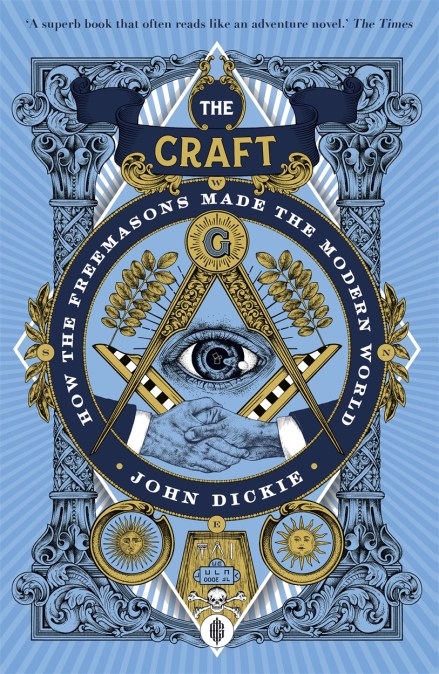‘Convincingly researched and thoroughly entertaining’ – Wall Street Journal
THE TIMES BEST BOOKS OF 2020
‘This book shows that, despite rumours of demon dwarfs, piano-playing crocodiles and world domination, the real story of the Freemasons is one of male eccentricity.’
‘The Craft is a superb book that often reads like an adventure novel. It’s informative, fascinating and often very funny. The depth of research is awe-inspiring, but what really makes this book is the author’s visceral understanding of what constitutes a good story.’ – The Times Book of the Week
‘[John Dickie] takes on this sensational subject with a wry turn of phrase and the cool judgment of a fine historian… I enjoyed this book enormously. Dickie’s gaze is both wide and penetrating. He makes a persuasive case for masonry’s historic importance.’ – Dominic Sandbrook, Sunday Times
‘The Craft is a shadow history of modernity. Though more sober than most lodge meetings, it is, like its subject, ingenious and frequently bizarre… The Craft is well-crafted and sensible, making good use of English archives which have only recently been opened.’ – Spectator
***
Insiders call it ‘the Craft’.
To the rest of us, Freemasonry is mysterious and suspect. Yet its story is peopled by some of the most distinguished men of the last three centuries: Winston Churchill and Walt Disney; Wolfgang Mozart and Shaquille O’Neal; Benjamin Franklin and Buzz Aldrin; Rudyard Kipling and ‘Buffalo Bill’ Cody; Duke Ellington and the Duke of Wellington.
Founded in London in 1717 as a set of character-forming ideals and a way of binding men in fellowship, Freemasonry proved so addictive that within two decades it had spread across the globe. Masonic influence became pervasive. Under George Washington, the Craft became a creed for the new American nation. Masonic networks held the British empire together. Under Napoleon, the Craft became a tool of authoritarianism and then a cover for revolutionary conspiracy. Both the Mormon Church and the Sicilian mafia owe their origins to Freemasonry.
The Masons were as feared as they were influential. In the eyes of the Catholic Church, Freemasonry has always been a den of devil-worshippers. For Hitler, Mussolini and Franco the Lodges spread the diseases of pacifism, socialism and Jewish influence, so had to be crushed.
Professor Dickie’s The Craft is a surprising and enthralling exploration of a movement that not only helped to forge modern society, but still has substantial contemporary influence. With 400,000 members in Britain, over a million in the USA, and around six million across the world, understanding the role of Freemasonry is as important now as it has ever been.
THE TIMES BEST BOOKS OF 2020
‘This book shows that, despite rumours of demon dwarfs, piano-playing crocodiles and world domination, the real story of the Freemasons is one of male eccentricity.’
‘The Craft is a superb book that often reads like an adventure novel. It’s informative, fascinating and often very funny. The depth of research is awe-inspiring, but what really makes this book is the author’s visceral understanding of what constitutes a good story.’ – The Times Book of the Week
‘[John Dickie] takes on this sensational subject with a wry turn of phrase and the cool judgment of a fine historian… I enjoyed this book enormously. Dickie’s gaze is both wide and penetrating. He makes a persuasive case for masonry’s historic importance.’ – Dominic Sandbrook, Sunday Times
‘The Craft is a shadow history of modernity. Though more sober than most lodge meetings, it is, like its subject, ingenious and frequently bizarre… The Craft is well-crafted and sensible, making good use of English archives which have only recently been opened.’ – Spectator
***
Insiders call it ‘the Craft’.
To the rest of us, Freemasonry is mysterious and suspect. Yet its story is peopled by some of the most distinguished men of the last three centuries: Winston Churchill and Walt Disney; Wolfgang Mozart and Shaquille O’Neal; Benjamin Franklin and Buzz Aldrin; Rudyard Kipling and ‘Buffalo Bill’ Cody; Duke Ellington and the Duke of Wellington.
Founded in London in 1717 as a set of character-forming ideals and a way of binding men in fellowship, Freemasonry proved so addictive that within two decades it had spread across the globe. Masonic influence became pervasive. Under George Washington, the Craft became a creed for the new American nation. Masonic networks held the British empire together. Under Napoleon, the Craft became a tool of authoritarianism and then a cover for revolutionary conspiracy. Both the Mormon Church and the Sicilian mafia owe their origins to Freemasonry.
The Masons were as feared as they were influential. In the eyes of the Catholic Church, Freemasonry has always been a den of devil-worshippers. For Hitler, Mussolini and Franco the Lodges spread the diseases of pacifism, socialism and Jewish influence, so had to be crushed.
Professor Dickie’s The Craft is a surprising and enthralling exploration of a movement that not only helped to forge modern society, but still has substantial contemporary influence. With 400,000 members in Britain, over a million in the USA, and around six million across the world, understanding the role of Freemasonry is as important now as it has ever been.
Newsletter Signup
By clicking ‘Sign Up,’ I acknowledge that I have read and agree to Hachette Book Group’s Privacy Policy and Terms of Use

